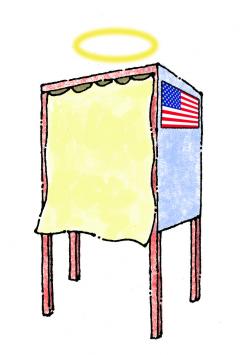Election Day shouldn’t be a time to leave our faith at home.
Religion is the problem,” said a friend at a late summer barbecue. “If we could keep religion out of politics, things would be a lot less crazy.” Heads nodded. Being the only active churchgoer in the room, I tried to protest—but then had to admit that my faith often steers my vote, as if that was some kind of civic failure. At the same time I found it odd that no one thought money or partisanship was the problem in our stumbling political system.
The conversation came on the heels of Texas Gov. Rick Perry’s “The Response,” which gathered 30,000 at a revival-style rally just prior to his announcement as a Republican presidential candidate. Minnesota Congressional Rep. Michele Bachmann, a darling of the Tea Party, was speaking openly of feeling called by God to run for the presidency. Neither connected their faith to specific policy positions. Their public devotion to Christ as evangelical Christians was their political calling card.
Catholics, on the other hand, seem to be keeping their faith out of the voting booth, at least when it comes to following the U.S. bishops’ “Faithful Citizenship” document, an outline of principles to help guide Catholics on Election Day. A study released by the Center for Applied Research in the Apostolate in September showed that in 2008, only 16 percent of Catholics were aware of the bishops’ statement; only 10 percent actually read any of it. A mere 4 percent of Catholic voters surveyed said it would have had a major influence on their vote whether they read it or not. Even among regular Mass-goers who were aware of the document, only 9 percent said it held major sway in their electoral choices.
That ought to be cause for concern to any Catholic as the next election cycle begins, no matter what one’s political leanings. At a time when the social safety net for the elderly is described as a “Ponzi scheme,” when medical care for the poor is on both state and federal chopping blocks, and when the very idea of the common good—the foundation of Catholic social teaching—is dismissed as “socialism,” people of faith cannot be silent. Any politician who openly claims to have faith in Jesus must be asked how that faith will affect their approach to the poor, the sick, the dying, and the unborn.
But integrity demands something more of a Catholic voter: asking those same questions of ourselves. Do we proclaim our opposition to abortion or same-sex marriage only so that we can in good conscience vote for a Republican who will keep our taxes so low that our obligations to the common good—Social Security, education, health care, highways—could never be met? Or do we wrap ourselves in the church’s social justice teaching and vote for a Democrat who will make sure the government takes care of the poor and sick, and so relieve us of our Christian duty to perform works of mercy and justice for those in need? To put it bluntly, do we use our faith as a cover for personal benefit?
It is this kind of hypocrisy—self-interest disguised as religious observance—that my friend detects, and it was the kind of hypocrisy that Jesus condemned in the religious leaders of his own day.
Still, if people of faith withdrew their voices and values from politics, whose would be left? Will corporations raise their voices for just wages, paid sick leave, and workplace safety? Will lobbyists for the military encourage cuts in the Pentagon budget to fund education for poor children? Will health insurance companies demand that pregnancy not be included as an exclusionary pre-existing condition or that the poor receive the same quality of health care regardless of their ability to pay?
Those who wish to separate the worlds of politics and religion often cite Jesus’ words in Mark 12:17 as their scriptural warrant: “Give to the emperor the things that are the emperor’s, and to God the things that are God’s.” Thank goodness Martin Luther King, Jr. and his companions did not buy that interpretation, or we would be even farther from racial justice than we are today. Thank goodness believers opposed to the Vietnam War did not heed it, as well as those who, driven by faith, sought to abolish slavery or who now fight to overturn the death penalty.
Those movements, simultaneously religious and political, were rooted in another well-known saying of Jesus just a few verses later, which applies no less to our own political moment: “You shall love your neighbor as yourself” (Mark 12:31). Candidates and voters alike, take heed.
This article appeared in the November 2011 issue of U.S. Catholic (Vol. 76, No. 11, page 8).
Image: Tom Wright












Add comment